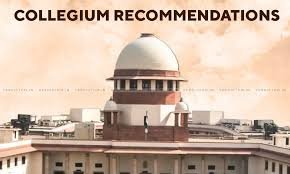Supreme Court Collegium Recommends Permanent Judges for 3 High Courts
The Supreme Court collegium has recently made significant recommendations for the appointment of permanent judges to three High Courts. This decision highlights the ongoing efforts to strengthen the judicial system and ensure timely delivery of justice. The collegium’s recommendation comes after thorough evaluations and consultations, ensuring that qualified individuals with experience and integrity are appointed to these prestigious positions.
The three High Courts selected for the appointments are crucial in the administration of justice across various regions of India. These decisions align with the judiciary’s commitment to enhancing efficiency and transparency within the judicial framework. The appointments are expected to have a significant impact on the legal landscape of the respective states, as High Courts play a vital role in interpreting laws, handling critical cases, and contributing to the development of jurisprudence in the country.

Why This News is Important
Impact on Judicial Efficiency
The Supreme Court’s recommendation for permanent judges aims to fill vacant positions in key High Courts, which is crucial for the smooth functioning of the judiciary. These positions, if left vacant, could lead to a backlog of cases, delaying justice for citizens. Appointing permanent judges ensures that the courts can handle the growing caseloads efficiently, delivering quicker judgments and reducing pendency.
Strengthening the Judiciary
Permanent appointments reflect the judiciary’s commitment to stability and continuity. It also sends a positive message about the competence of the judicial system and its ability to function without interruptions. The judiciary’s autonomy is bolstered, as the appointments are made based on merit, ensuring fairness and equality in the system.
Encouraging Judicial Reforms
This recommendation can also be seen as part of larger judicial reforms aimed at modernizing the system. By filling critical positions with experienced judges, the system moves towards a more responsive and dynamic judicial process, adapting to the changing needs of the country.
Historical Context: Background Information
The concept of the judicial collegium, which recommends the appointment of judges to the Supreme Court and High Courts, was introduced in the early 1990s after a landmark judgment by the Supreme Court in the Supreme Court Advocates-on-Record Association vs. Union of India case (1993). This case established the collegium system, granting the judiciary a central role in the appointment of judges.
The collegium system was adopted to maintain judicial independence and prevent undue influence from the executive branch. Over the years, the system has evolved, and while it has faced challenges, it remains a cornerstone of the Indian judiciary’s structure. The recent recommendations by the collegium reflect the ongoing efforts to address judicial vacancies, improve case management, and strengthen the rule of law in India.
Key Takeaways from “Supreme Court Collegium Recommends Permanent Judges for 3 High Courts”
| Serial Number | Key Takeaway |
|---|---|
| 1 | The Supreme Court collegium has recommended permanent judges for three High Courts to address judicial vacancies. |
| 2 | These appointments are expected to reduce the backlog of cases and improve judicial efficiency. |
| 3 | The recommendations align with the ongoing efforts to strengthen the judicial system and ensure timely justice. |
| 4 | The judicial collegium system plays a crucial role in maintaining the independence of the judiciary in India. |
| 5 | The appointment of permanent judges reflects the judiciary’s commitment to stability and enhancing legal transparency. |
Important FAQs for Students from this News
What is the Supreme Court collegium’s role in the appointment of judges?
- The Supreme Court collegium is responsible for recommending the appointment of judges to the Supreme Court and High Courts. It consists of the Chief Justice of India and other senior judges who evaluate candidates based on their legal expertise and experience.
Which High Courts are involved in the recent recommendation for permanent judges?
- The Supreme Court collegium has recommended the appointment of permanent judges for three High Courts. These High Courts play a key role in delivering justice and interpreting laws at the regional level.
Why is the appointment of permanent judges important for the judicial system?
- Appointing permanent judges ensures that the High Courts can function effectively without delays caused by vacancies. It helps in reducing the backlog of cases, thereby improving judicial efficiency and ensuring timely justice.
What is the judicial collegium system in India?
- The judicial collegium system, introduced in the 1990s, is a process where the judiciary is given the authority to recommend the appointment and transfer of judges. It ensures the independence of the judiciary from the executive.
How does the appointment of permanent judges impact citizens?
- The appointment of permanent judges helps in quicker resolution of legal cases, reducing delays and backlogs, which directly benefits citizens seeking justice.
Some Important Current Affairs Links

















